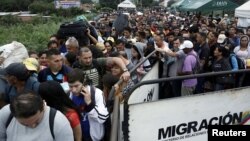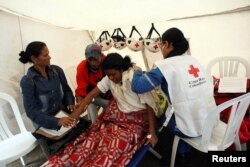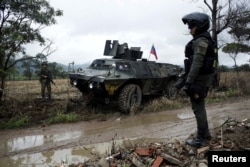Ongoing critical shortages of medical supplies and services can make life precarious in Venezuela, goading some to seek health care abroad.
So many have fled to neighboring Colombia for health and other reasons that its president, Juan Manuel Santos, announced last week that his country would beef up security along the 2,205-kilometer border. Just last month, Santos had reiterated Colombia's longstanding offer of "humanitarian support in the matter of food and medicines," and his criticism that "the Venezuelan government has refused because they do not want to accept the serious crisis they have on their hands."
Colombia's foreign ministry estimates that roughly 600,000 Venezuelans have arrived in the country, straining the health system.
Mother's story
Among them is Jasmine Sibulo, who, in the midst of labor pains, left an under-equipped hospital in her Venezuelan hometown of San Antonio del Tachira in search of a safe facility in this teeming border city.
Sibulo said she had labored unattended for hours at a hospital across the river in San Antonio, Venezuela, where a staff member finally urged her to go elsewhere to find care and an incubator. Sibulo had calculated she was eight months pregnant and the baby would be premature.
"As soon as I entered the Erasmo Meoz [University] Hospital, I had the baby here in the hall at once," Sibulo said of daughter Mia Salome, lying beside her on a stretcher in the hallway an hour after the baby's birth.
"It is unfortunate that one can't receive attention. My God protected me; I waited for the precise right moment to give birth," the young mother told VOA that July day.
As it turned out, her baby was healthy at birth.
Juan Agustin Ramirez Montoya is general manager of Erasmos Meoz, a public hospital that accepts patients for emergency care even if they can't pay. That includes Venezuelan migrants. He has accepted that responsibility but worries.
"We are not prepared for an onslaught of patients. We could collapse at any time," he told VOA.
By December, the hospital accumulated a $3 million debt for treating Venezuelans, and "we still haven't received a peso from the ministry of health," Ramirez told IRIN, a news agency that covers humanitarian issues.
Colombia's health ministry had pledged extra funds to deal with the migrant influx.
With stocks of medicine depleted, infectious diseases such as malaria and measles are spreading alarming Colombian health officials.
Those in the northeast Colombian province of Norte de Santander, of which Cucuta is the capital, announced last month that they were planning measures such as vaccination and mosquito fumigation campaigns to control the spread of disease and create "an epidemiological fence," as El Colombiano newspaper reported.
United Nations Secretary-General Antonio Guterres assured Colombia that the Andean country could count on the organization to provide more resources to care for Venzuelan migrants. During a visit in January, Guterres praised Colombia's humanitarian efforts and said, "… We are even willing to mobilize other international help as is possible."
Failing health system
Venezuela's failing health infrastructure has heightened vulnerabilities across the country.
In southeastern Bolivar state, former Major League Baseball pitcher Marcos Carvajal died of pneumonia Jan. 23 in his hometown of Ciudad Bolivar. The family of the 34-year-old, who was working as a youth coach, had struggled to find antibiotics to treat him while his condition worsened, a local baseball official told the Associated Press.
Carvajal had pitched for the Colorado Rockies in 2005 and then briefly for the Miami Marlins.
At least 85 percent of medicines were in short supply, the Pharmaceutical Federation of Venezuela last year. The federation also said at least 13,000 doctors had left the country.
Venezuelan President Nicolas Maduro has blamed the shortages of medicine what he contends is a U.S.-led "economic war" and falling oil prices.
Venezuela's Health Ministry disclosed last spring that the number of women dying from childbirth had jumped by 66 percent since 2014 and that of children dying before their first birthday had climbed by 30 percent. (It recorded 756 maternal deaths and 11,466 infant deaths in 2016, Reuters reported, noting that many doctors have left the country.)
Maduro fired the health minister two days after the data appeared on the ministry's website.
In July, Venezuela's government announced plans to provide free prenatal and midwife care as part of a new National Humane Birth Plan, according to local media reports. The plan includes training thousands of activists as midwives or "doulas."






